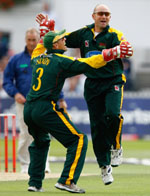Psychology is just good cricket thinking
There is no one in the UK cricket scene who knows more about sport psychology than Jeremy Snape.
He rightly points out that if 80% of cricket is in the head, why do we only spend 5% of the time working on our mental game?
 But the England international, Master in Sports Psychology, and captain of Leicestershire CCC isn't into airy-fairy discussions about your relationship with your mother. Running his own company, Sporting Edge Solutions, he leaves the word 'psychology' with all it's negative connotations at the door and trains top class players in the practical application of performance thinking.
But the England international, Master in Sports Psychology, and captain of Leicestershire CCC isn't into airy-fairy discussions about your relationship with your mother. Running his own company, Sporting Edge Solutions, he leaves the word 'psychology' with all it's negative connotations at the door and trains top class players in the practical application of performance thinking.
That's the kind of talk I love to hear, so I asked Jeremy how much club players could apply cricket thinking too.
New Cricket Thinking
"Sport psychology has had a bad image generally because the information is too theory driven." he told me. Players at all levels don't want to be bogged down with books worth of ideas, they want simple ways to get better. I know I do.
Jeremy also knows getting your mindset better might be easier than you think: "At school, our best teachers were the ones who brought the subject to life. The old club pro might have the best advice on cricket thinking you ever hear!"
If cricket thinking is so simple, why isn't everyone doing it? it's partially related to the stigma of psychology, but timing is important too: "In the early stages of their cricket lives people are learning the skills of the game. Later on it becomes more of a concern to how those skills are delivered under pressure - this is the role of cricket thinking."
He explains how this approach can help players no matter who they play for, "Commonly, cricketers have no idea of how to shut out pressure or technical thoughts as they bat or bowl. A batsman may bat for over 3 hours in scoring a hundred but is only actually batting for around 8-10 seconds per delivery. It is how well we analyse and how well we switch off that determines our success."
Simple tricks work
Being able to make this switch could be as easy as refocusing your attention on the good things, "Try keeping a diary of key thoughts and performances. This will help keep you on track. Don't magnify what you are doing wrong, look in detail at when and how you are at your best."
It's this kind of refreshing approach that cricket needs. It helped Leicestershire to win the coveted Twenty20 Cup in 2006 and with Jeremy preparing the team, his hopes are for more success in 2007: "If we can deliver our skills under pressure, another trophy is not out of the question!"
Good luck to Jeremy and Leicestershire. Let's all hope we can learn something from their success.
You can find out more about performance thinking by visiting the Sporting Edge Solutions website which will shortly feature personal interviews with top sportsperformers like Nasser Hussain, Martin Johnson, Tim Henman and Glenn McGrath.
- Login to post comments


Comments
[...] Jeremy Snape may know his cricket psychology, but he’s in trouble with Duncan Fletcher. [...]
[...] free to my RSS feed or get free email updates Thanks for visiting!Jeremy Snape (top cricketer and friend of the site) has decided to keep a diary of his experiences at the World [...]
[...] Cricket can be won and lost in the head probably more than any other game. It’s essential to learn the techniques to make your mental toughness and will to win as well developed as your cover drive (or googly). [...]